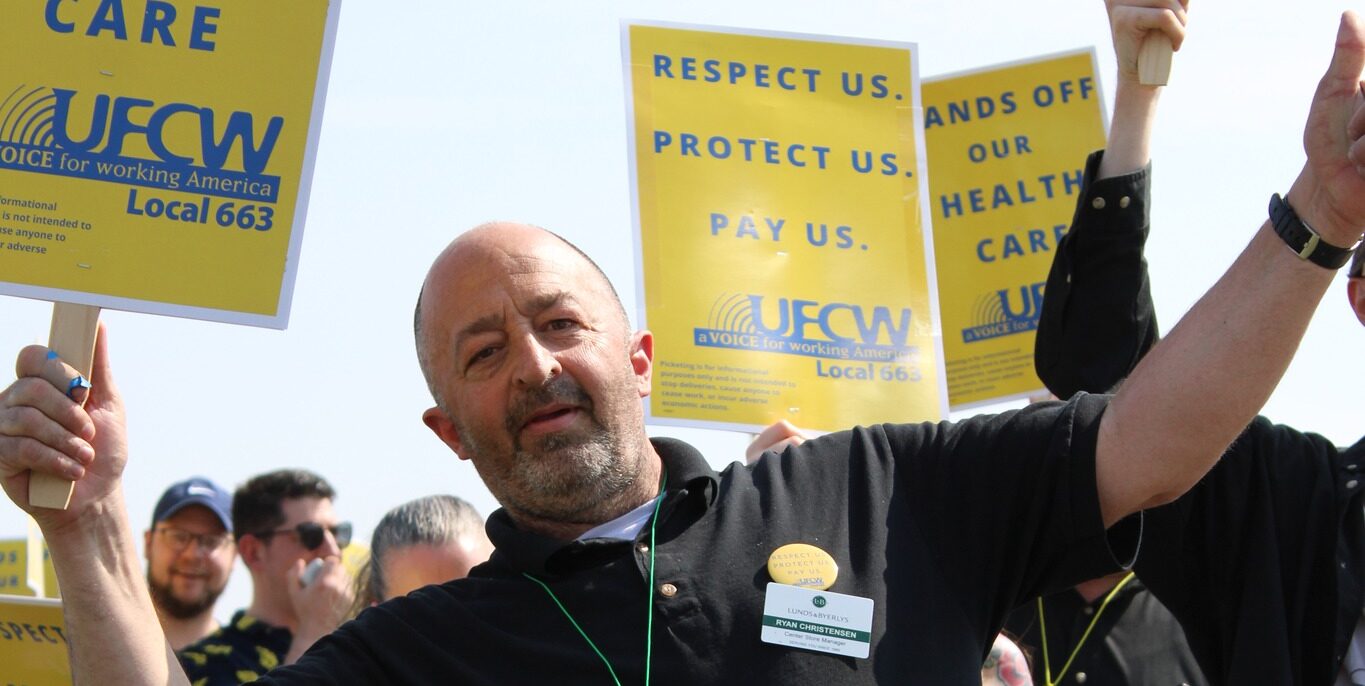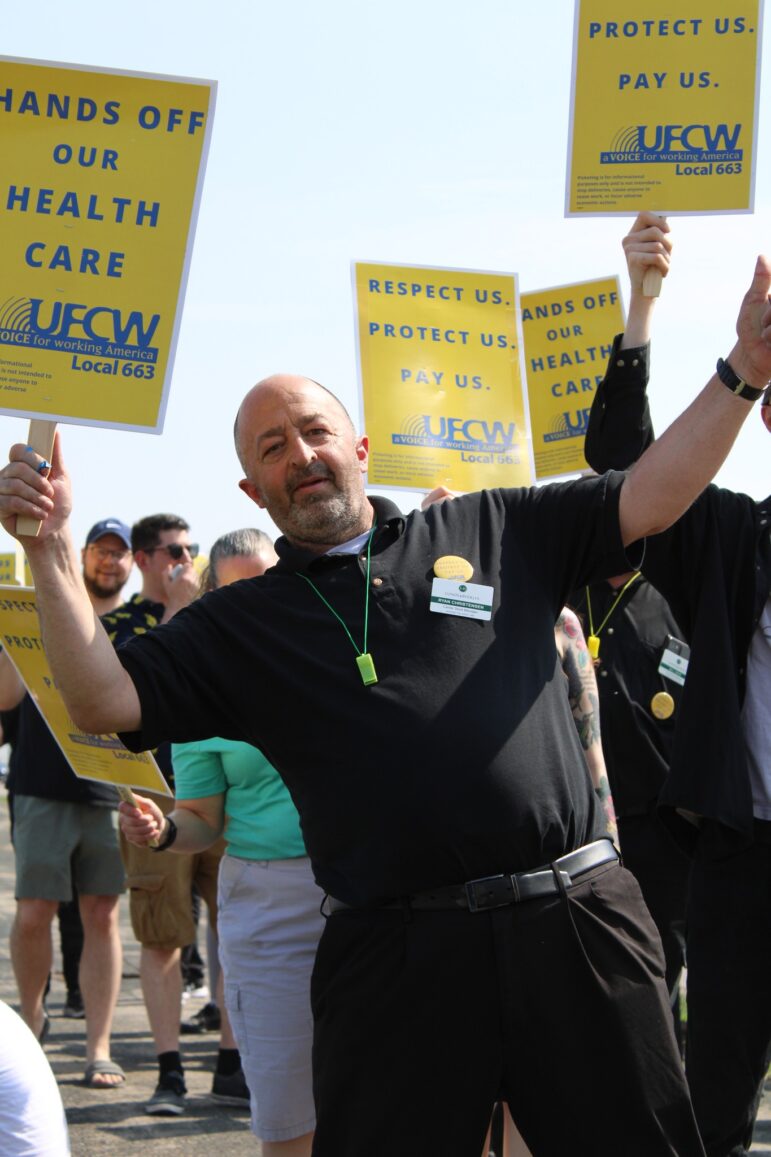
Ryan Christensen, a grocery store worker at Lunds & Byerlys for the past 38 years at a rally.

Share
Ryan Christensen is a 52-year-old grocery worker for Lunds & Byerlys, where he has been for 38 years. Christensen says that what was once a strong, family-supporting job has deteriorated over time. He was one of 9,000 grocery employees working on an expired contract across the Twin Cities Metro rallying under the demand “One good job should be enough.”
Last week, workers ratified contracts with four companies—including the one where Christensen works. But grocery workers, represented by United Food and Commercial Workers International Union (UFCW) Local 663, rejected contracts with three other companies, and strikes could be imminent.
Christensen commutes an hour and a half each way by car from his home in Richmond, Minn., to work at the Lunds location in Wayzata, Minn., six days a week. Twelve years ago, Christensen’s wife was diagnosed with ovarian cancer. The fight has made him a passionate advocate for stronger healthcare for his fellow grocery store workers.
Christensen spoke with Workday Magazine about his experience after almost four decades in the industry. He voted no on the contract, and says he is prepared to help build power for 2028, when the Lunds & Byerlys contract is set to expire. The following interview has been edited for clarity and length.

UFCW Local 663
Ryan Christensen, a grocery store worker at Lunds & Byerlys for the past 38 years at a union rally.Workday Magazine: What is your position at Lunds & Byerlys?
Christensen: I’m a center store manager. I’m in charge of all the center of the store, all the grocery, dairy, frozen, and a lot of other things. Because I’ve been working here for 38 years, I’m experienced to do a lot of different things.
Workday Magazine: That is a long time! When did you begin?
Christensen: Ever since high school, 10th grade.
Workday Magazine: What has kept you coming back to this job all these years?
Christensen: I enjoy doing what I do, but I’m just not having fun anymore. After the past two contracts, I’m at this point where I’m angry. I’ve had many meetings with corporate and it just seems like they lie in my face.
I’ve worked 38 years because I love what I’m doing. My work is like a family. When you lose trust with your employers, it’s no different than a relationship. They don’t seem to care about the battles that I’m dealing with outside of work. But the union has.
Workday Magazine: Can you tell me more about those struggles you’ve been dealing with outside of work?
Christensen: My wife’s been fighting ovarian cancer for 12 years. We live for today, not tomorrow. During the last contract fight, which was two years ago, it got to the point where we didn’t think she was going to make it. Her cancer came back and she ended up fighting it. She’s currently in remission.
My wife likes to fish, and that’s the one thing that makes her happy. So we moved out there because I know how much she enjoys fishing. So that’s why I live here and why I’m about an hour-and-a-half drive each way for my commute. When I worked at Lunds & Byerlys in Eagan, Minn., I was over two hours away. I do everything for my wife.
We bought a brand new boat, a pontoon. We go together pretty much everyday in the summertime when I come home from work. Doesn’t matter what time of the day it is, we go fishing. And during the summer I take a lot of vacation time, so that we can do more of that together.
Workday Magazine: What lessons did you learn? What are your takeaways from the time you spent on the ground, worker-to-worker organizing?
Christensen: As far as Lunds & Byerlys employers go, a lot of workers are pretty mad. In 2028, when the next contract expires, somebody is going to have to answer to the increased healthcare costs workers will be facing. And the fingers will be pointed at the company.
I plan on organizing and fighting for everybody to make sure that this doesn’t happen again. I will be out organizing whether I can leave work or not. I’ll organize outside of work, go to every story I can, because people got to get on board and people got to understand what’s happening with the healthcare plan. People are afraid because they’re intimidated. When you speak and you want to move up, you’re punished. I speak for everybody and you can’t shut me up. I’m fighting for my healthcare and I’m fighting for my wife.
Workday Magazine: Can you tell me more about the last contract fight two years ago?
Christensen: That was really bad. We were lied to so many times. It was really tough. After the contract was all said and done, these corporate big shots were coming to me to apologize for what they put me through. I didn’t accept their apology. I told them they can’t treat people like dirt. Never once did anybody ever come up to me and ask me how my wife was doing. They didn’t care.
When I got transferred out of the Eagan location, usually they would have a cake, a card, and a going away party. I was at that store for nine years. They didn’t give me nothing. They threw me out the door as fast as they could. And the reason they did it was because I was fighting for our healthcare. To this day, it still hurts. I work six days a week and I bust my ass and I just feel like the company has just turned on all of us. It takes such a toll.
Workday Magazine: It sounds like you were pretty involved in the recent contract negotiations?
Christensen: The contract two years ago was so hard on me because my wife was in the hospital. I would get to work at seven o’clock in the morning, and I’d have to leave at five in the morning to get there on-time. I wouldn’t get home until eight o’clock at night, because I was going to all the meetings. I was going to all the events.
For this most recent contract, I visited the stores to talk with workers. I went to things on my own, on my time off. I went to stores to talk to workers that don’t know what’s going on, let them know that they need healthcare more than they need a raise. It opens their eyes.
Lunds & Byerlys has this thing where they claim that they’re “a top 200 employer.” It’s an absolute joke. When we were eight hours from striking two years ago, they hung those signs on the outside of the building so customers could see it, to make it look like the employees voted them as a top 200 employer, which nobody did.
Workday Magazine: I’ve seen those signs on the stores and always wondered what that was all about and what the workers would have to say about that.
Christensen: They were a good company at one time. But they’ve totally changed, it’s pretty obvious what’s going on. It just makes me sick at the end of the day.
Workday Magazine: Why is it so important to improve the standards for grocery store workers? Especially given that you were designated essential workers during the pandemic, and on the frontlines of other political moments, like raising prices, tariffs, and shortages?
Christensen: We are the ones that put the food out so people can buy the products. We’re the ones that keep the stores full so people can purchase what they need. During the pandemic, I got Covid four times. I was at a risk because I wouldn’t go home because I couldn’t get my wife sick. Times have changed and we’re putting our lives at risk.
Workday Magazine: What was your experience working in a grocery store during the height of the pandemic, especially as someone who lived with someone with cancer?
Christensen: I would test myself a lot of times, even when I wasn’t feeling sick. I got a bunch of Covid tests and my mom had bought me a lot of them too. There were a lot of times where I wouldn’t be in the same room as my wife, I would go in another room. Especially during the wintertime and the holidays. You can’t distance yourself in the stores that I’m in. I work in the busiest stores. When it’s busy, you get people coming up to you, coughing on you. I had to change my ways when I was at home. My wife was always saying that we can’t live like this. But if something had happened, I would have taken that so hard, if I got Covid and passed it on to her.
Workday Magazine: That’s so much responsibility and stress being placed on the frontline workers. And I feel like so much of that essential worker rhetoric that we heard back then is not being used anymore.
Christensen: It’s crazy. This past winter, I actually got Covid here. It’s still out there.
Workday Magazine: Do you think it’s possible that workers are so fed up in 2028 that they are more ready to take action whether it’s speaking up, striking, or taking action in other ways?
Christensen: I personally think they will be. I think people are going to be livid come 2028. The union needs to get things in place.
A strike fund thing would be really huge. Personally, I don’t need a strike fund for me to strike. From what I’m hearing from a lot of employees, they would vote to strike if they had one.
What I’ve done here at the Wayzata location is I got one person in each department that is as strong as me and we work as a team to talk to the employees. That’s what we need to do at the other stores. You can’t have one person trying to rally up everybody. You gotta pick your people that are the strongest to get everybody on the same page so that you can give workers the information that they need to know.
Workday Magazine: What do you think more people should know about grocery workers?
Christensen: The biggest thing about all of this is that there’s a reason why people are in their 60s and 70s and still working—the reason they’re still working is because of healthcare. A lot of people would love to retire when they’re 60. And that’s the big picture about this thing that people need to know. We’re not asking for much.

